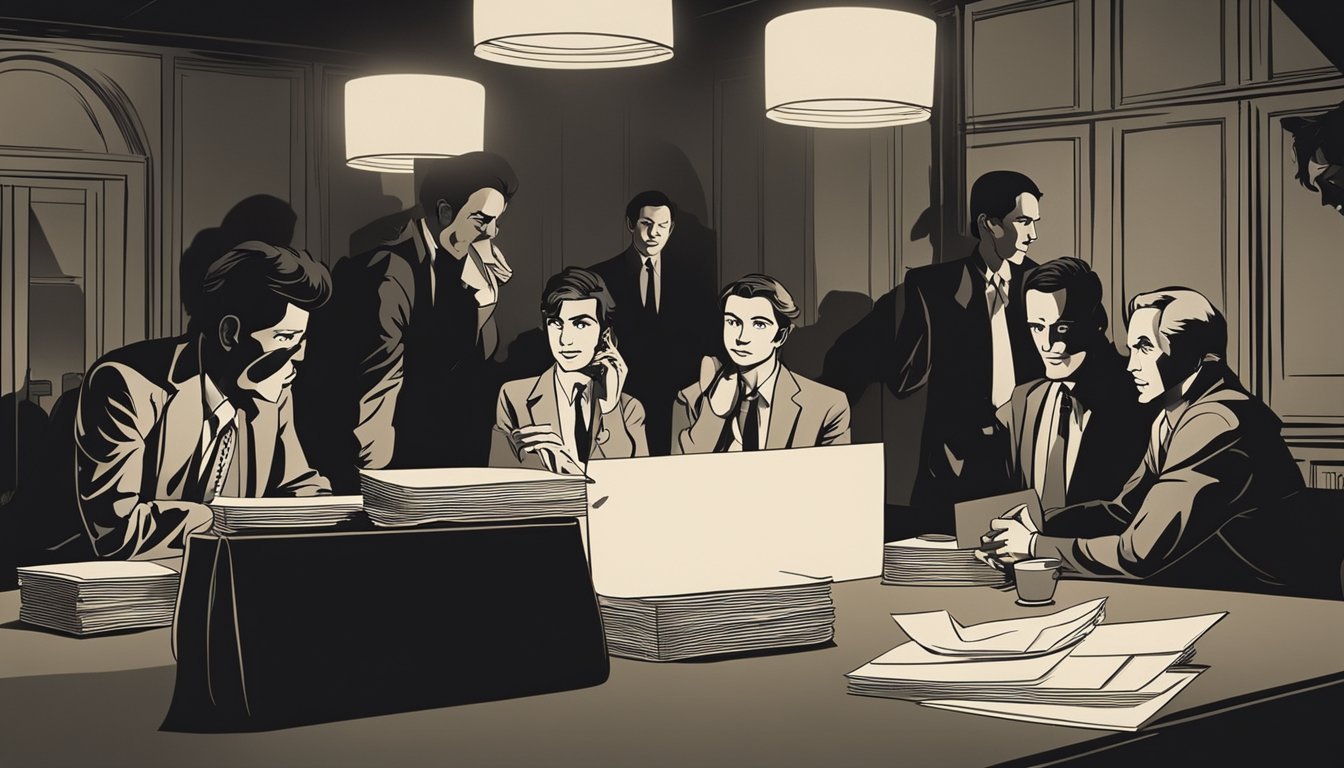7 Films About Political Betrayals
Unveiling Dark Realities
Exploring the theme of political betrayal, cinema has long captured the drama, intrigue, and consequences of power struggles within governments. These films provide insight into the complexities of political machinations and the often devastating impact of corruption and deceit.
Why do audiences find tales of political betrayal so compelling? The allure lies in the high stakes and moral quandaries faced by the characters, reflecting real-world concerns and questioning the integrity of those in power. Through these narratives, viewers gain a deeper appreciation for the precarious nature of political trust and the constant vigilance required to sustain democracy.
1) All the President's Men (1976)
"All the President's Men" is a 1976 American biographical political thriller about the Watergate scandal. The film is directed by Alan J. Pakula and features a screenplay by William Goldman.
The story is based on the book by Carl Bernstein and Bob Woodward, the two journalists from The Washington Post who investigated the scandal.
Dustin Hoffman and Robert Redford star as Bernstein and Woodward. Their meticulous reporting uncovers details that eventually lead to President Richard Nixon's resignation.
The film stands out for its accurate portrayal of investigative journalism. It offers a detailed look into the processes journalists use to uncover corruption.
This work not only captures the political climate of the 1970s but also demonstrates the power of the press in holding public officials accountable.
For more information, visit Wikipedia.
2) The Ides of March (2011)
The Ides of March, directed by George Clooney, is a gripping political drama.
Set during the frantic days before a heavily contested Ohio presidential primary, the film uncovers the sinister side of politics. Ryan Gosling stars as an idealistic campaign staffer who faces ethical challenges and disillusionment while working for Clooney's character, a presidential candidate.
The screenplay, based on Beau Willimon's play Farragut North, explores themes of betrayal and moral compromise. With a stellar cast including Philip Seymour Hoffman, Paul Giamatti, Marisa Tomei, and Evan Rachel Wood, the film provides a realistic portrayal of the cutthroat nature of political campaigns.
For more information, visit Wikipedia
3) House of Cards (2013)
"House of Cards" explores the dark side of American politics through the machinations of Frank Underwood, played by Kevin Spacey. The show is based on Michael Dobbs' 1989 novel and a 1990 British series adaptation. Underwood's ruthless pursuit of power and revenge offers a vivid portrayal of political betrayal.
The series debuted on Netflix, becoming a cultural phenomenon. It significantly influenced the streaming industry's evolution. Robin Wright co-stars as Claire Underwood, showing how power dynamics can shift within a political marriage.
The show features intricate plots involving corruption, manipulation, and murder. Themes of betrayal are central as characters navigate a cutthroat environment to secure their ambitions, reflecting the real-world political intrigue. "House of Cards" remains a significant entry in the genre of political dramas.
4) JFK
Oliver Stone's film "JFK" (1991) provides an in-depth look at the assassination of President John F. Kennedy. The movie is based on the investigations of New Orleans District Attorney Jim Garrison, who questioned the official narrative presented by the Warren Commission.
The film explores various conspiracy theories, suggesting that Lee Harvey Oswald did not act alone. Garrison, played by Kevin Costner, uncovers a web of intrigue involving the CIA, the military-industrial complex, and organized crime.
"JFK" effectively uses courtroom drama and flashbacks to present its narrative. The film's detailed examination of evidence and testimonies challenges viewers to reconsider what they know about this pivotal event in American history.
For more information, visit IMDB.
5) The Manchurian Candidate (1962)
"The Manchurian Candidate" is a renowned political thriller directed by John Frankenheimer. The film is based on Richard Condon's 1959 novel of the same name. It stars Frank Sinatra, Laurence Harvey, and Angela Lansbury.
The plot revolves around Raymond Shaw, a U.S. Army sergeant who is brainwashed into becoming an unwitting assassin for a Communist conspiracy. The manipulation and control themes highlight the dark side of politics and power.
Angela Lansbury's portrayal of Shaw's manipulative mother is chilling and earned her high praise. The film’s psychological tension and intricate conspiracy make it a standout in the political betrayal genre.
It has been lauded as a classic of American cinema and remains influential, leading to a successful remake in 2004. The original 1962 version, however, holds a special place for its historical context and compelling narrative.
For more information, visit the Wikipedia page.
6) The Lives of Others (2006)
The Lives of Others, directed by Florian Henckel von Donnersmarck, is a gripping German drama set in East Berlin in 1984. The film focuses on the surveillance activities of the Stasi, East Germany's secret police, as they monitor the lives of citizens suspected of political dissent.
Stasi Captain Gerd Wiesler, portrayed by Ulrich Mühe, is tasked with spying on a successful playwright, Georg Dreyman, and his actress girlfriend, Christa-Maria Sieland. Wiesler's role demands cold detachment and unwavering loyalty to the state.
As Wiesler immerses himself in the couple's daily lives through hidden microphones, he becomes conflicted. The personal experiences he overhears lead him to question his own moral beliefs and the oppressive regime he serves.
The Lives of Others is not just a political thriller but a profound exploration of human ethics and personal transformation. The film vividly depicts the paranoia and control pervasive in authoritarian regimes, making it a powerful commentary on state surveillance and individual freedom.
For more information on The Lives of Others, visit the Wikipedia page or the IMDb page.
7) Z (1969)
"Z", directed by Costa-Gavras, stands as a seminal film in the genre of political thrillers. It is based on the novel by Vassilis Vassilikos, which fictionalizes the real-life assassination of Greek politician Gregoris Lambrakis.
The film focuses on the investigation following the murder, highlighting the mechanisms of political corruption and the ensuing cover-up. Jean-Louis Trintignant plays the role of the examining magistrate who seeks justice against powerful forces trying to suppress the truth.
"Z" brilliantly combines suspense and political commentary, capturing the tension and paranoia of the time. It received widespread acclaim for its sharp direction, editing, and performances, particularly by Irene Papas and Yves Montand.
With its critical stance on government corruption, "Z" remains relevant, reflecting on the impact of political maneuvering and injustice. It won multiple awards, including an Academy Award for Best Foreign Language Film.
For more information, visit Z on Wikipedia.
Historical Context of Political Betrayals
Political betrayals have marked history, especially during times of major power struggles and deceit. These betrayals often expose the darker side of politics, revealing how far individuals or groups will go to achieve their goals.
Political Intrigue and Power Struggles
Political intrigue often occurs in environments where power is highly concentrated. Leaders and influential figures engage in secret plots to gain advantage or to undermine opponents. Techniques range from espionage and covert operations to slander and manipulation.
Historical examples of political intrigue include the machinations of ancient Roman senators and the undercover operations during the Cold War. These actions can destabilize governments and lead to significant shifts in power.
Political intrigue is driven by the desire for power, control, and dominance. Such struggles have shaped the course of nations, often leading to significant historical events and policy changes.
Notable Historical Examples
There are several prominent instances of political betrayals that have left indelible marks on history. One of the most famous is the Watergate scandal in the United States, which led to President Nixon's resignation.
Another notable example is the betrayal of Julius Caesar by Brutus and other senators in ancient Rome. This act of treachery altered the Roman Republic's trajectory and paved the way for the rise of the Roman Empire.
These examples display not only the personal consequences for the individuals involved but also wider implications for their nations’ political landscapes. Political betrayals can often be turning points, dramatically shifting the balance of power.
Themes Explored in Films About Political Betrayals
Films about political betrayals often center on themes of corruption and deception, illustrating the moral decay within institutions and individuals. They also delve into the impact on society, highlighting the broader consequences of such acts.
Corruption and Deception
Political betrayal films reveal the intricate web of lies and corruption that underpin many political systems. Characters frequently engage in unethical behaviors, manipulate information, and exploit others for personal or political gain. These narratives highlight the moral compromises political figures make, often leading to intense personal and professional conflicts.
Films like "Watergate Secrets and Betrayals" use historical events to showcase how trust is systematically eroded through deceit. The portrayal of betrayal often involves plotting behind closed doors, secret alliances, and backstabbing, shedding light on the darker side of political ambition. The audience is given an inside look at the machinations that undermine democratic processes and the rule of law.
Impact on Society
The repercussions of political betrayals extend far beyond the individuals involved, affecting society at large. These films underscore the loss of public trust and the erosion of social cohesion that result from corruption. Societal impacts include increased cynicism, disillusionment with political systems, and in extreme cases, civil unrest.
In recounting these narratives, movies illustrate how public confidence in leadership is undermined, leading to long-term consequences for governance. They also emphasize the role of media and public opinion in bringing such betrayals to light, demonstrating the power of public accountability. By weaving these themes, political betrayal films serve as a stark reminder of the fragile nature of democratic institutions.







